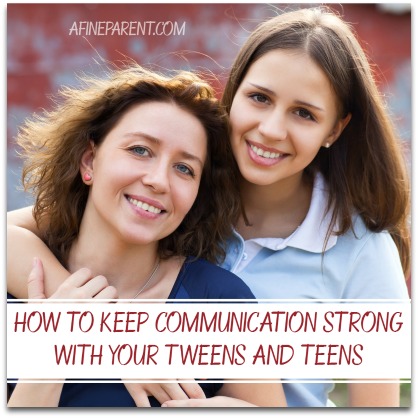 As your children grow, everything seems more important — mistakes have bigger consequences, peers can be a bigger negative influence, and there is potential for embarrassment on social media.
As your children grow, everything seems more important — mistakes have bigger consequences, peers can be a bigger negative influence, and there is potential for embarrassment on social media.
All of those things are real concerns.
As a response, many parents shift into “hypervigilant panic mode.”
They drill their children for answers. They hover over homework completion. They tighten the house rules and expectations.
This all comes from a well-meaning place. You love your children and want the absolute best for them. You don’t want to see them fail or struggle. And you definitely don’t want them to become distant.
Unfortunately, “panic-mode” usually backfires.
Instead of keeping your children close, they start to push back and pull away.
Thankfully, there are a few alternatives that will keep the communication with your tween or teen open and your relationship strong.
8 Tips for Strong Communication with your Tween or Teen
Keeping the communication with your children open and strong through the teen years may not come naturally to you at first. And that’s OK.
You don’t have to be a perfect communicator to be the support your child needs.
There are a few things to keep in mind as you go through the ups and downs of learning to communicate well with your child who is growing up to be an independent adult:
- The only person you can control is you. As much as you’d like to influence your child’s every move, you can’t. So, keep the focus on your own emotions, thoughts, and actions.
- Calm yourself before responding. One deep breath may be the difference between a productive conversation and a power struggle. Imagine what three deep breaths would do!
- Use other adults as a sounding board or for venting frustrations. When you’re feeling overwhelmed, seek support from friends or a mental health professional.
- Be flexible rather than rigid. Explore other options and look at things from different perspectives. If something doesn’t work, try it a different way.
- Don’t give up. Your child needs you. You. In all of your imperfections, mistakes, and quirks. Stick with them and remain committed to the relationship.
OK, onto the tips:
1. Give Them Your Attention
 Do you know how frustrating it can be when your child is staring at their phone instead of listening to you? Yep. It can feel the same way to your child. Rather than trying to multitask, give them your focused attention. This may mean putting your phone aside or stopping what you’re doing. If you really can’t give your attention, reschedule for a later time, but realize the moment may pass and your child may no longer want to talk about it later.
Do you know how frustrating it can be when your child is staring at their phone instead of listening to you? Yep. It can feel the same way to your child. Rather than trying to multitask, give them your focused attention. This may mean putting your phone aside or stopping what you’re doing. If you really can’t give your attention, reschedule for a later time, but realize the moment may pass and your child may no longer want to talk about it later.
2. Watch Your First Response
Phrases like, “You went WHERE?!” or “You did WHAT?!” are guaranteed to end the conversation. Jumping into anger or panicking are also ineffective. Instead, take a deep breath and pause before you respond. This helps you stay present with your child and remain focused on the conversation. It also demonstrates to your kids that you are a safe place to talk about big feelings, problems, and concerns.
3. Keep Opinions to Yourself
As your child grows, they will become more passionate about friends, causes, and ideals. Resist the urge to comment on the quality of the friendship or make judgement calls about a friends’ character. Negative comments about things that are important to your child may shut down communication or drive them away. Instead, be curious, willing to hear their opinion, even if it’s different from your own. Always intervene if safety is a concern.
4. Listen With the Intent to Understand
Keep the conversation moving by focusing less on your responses and more on truly understanding what your child is trying to say. Asking open-ended questions like, “Then what happened?” or encouraging them to “Tell me more about that” is a great way to gather more information. Ask clarifying questions if needed, and periodically repeat back what you hear, to make sure that you are really tracking with your child.
5. Don’t Solve It
Your child may not necessarily be looking to you for solutions to their challenges and problems. Often, what a child needs more than anything is a listening ear. Someone who is willing to sit with them while they process, cry, or think. Offering a “simple” solution usually ends the conversation and misses an opportunity to connect with your child. If you’re unsure what your child needs, ask, “Are you looking for solutions or do you just want me to listen?”
6. Offer Empathy
Knowing what to say, especially when big feelings bubble to the surface, can be uncomfortable. Rather than launching into a lecture, take a deep breath. Put yourself in your child’s shoes: How are they feeling? What’s going on emotionally? How would you feel in this situation? Then, put these answers into words. Keep it simple: “That must have felt lonely.” You don’t have to agree with their actions to see things from their perspective.
7. Brainstorm Together
Problems and challenges need solutions, not punishments. Instead of “laying down the law” or “showing them who’s boss,” engage your child in a problem-solving discussion. Use the skills above to set the stage: listen, gather information, and offer empathy. Then, express your concern. Look for ways that both you and your child can come to a mutually satisfactory solution. Review the solution after a few days and make changes as necessary.
8. Don’t Force Eye Contact
If your child is more reserved about talking with you, give them plenty of opportunities to communicate without the pressure of a face-to-face conversation. Some kids would rather talk via text, write back and forth in a notebook, or may bring something up while driving in the car. If your child is a slow processor or has difficulty organizing thoughts, avoid rapidly firing questions or lumping questions together. Allow time for thinking and silence.
Focus on the Relationship, Not Perfection.
 Even though your child may be seeking out their peers for support and encouragement more often, you still play a significant role in helping them make good choices and process through challenging situations.
Even though your child may be seeking out their peers for support and encouragement more often, you still play a significant role in helping them make good choices and process through challenging situations.
Embrace the opportunity to help your child practice emotion identification, problem solving, and healthy communication skills while they are still in your home.
If you find yourself shifting into “hypervigilant panic mode,” take a deep breath (or three).
Remind yourself to keep the relationship with your child the priority, rather than being right or having control.
Step back.
Find a way to reconnect with your child. Maybe it’s a hug, a little note, or a coffee date.
And then, give these communication tips another try.
—
 Want to learn more ways to strengthen the communication with your kids? Check out Nicole’s Communication for Imperfect Families e-course. Decrease the back talk, reduce the arguments, and find peace in your home.
Want to learn more ways to strengthen the communication with your kids? Check out Nicole’s Communication for Imperfect Families e-course. Decrease the back talk, reduce the arguments, and find peace in your home.


This was very helpful. Thanks very much
So great,thaks
Was helpful!
thank you this was a very good learning tool
Tweens or Teens have to be understanding by their parents, only on that way they will have a good relationship.
Thanks a lot for provide this amazing website here
When your kids starting to become teens their behavior also change. Often times they want to do things on their own. This is the reason why there’s always an issue between parents and child. But If you know the right way to deal with it.things will get better.
Instead of hovering over homework completion you need to explain why it’s important and maybe make it interesting. Give prizes for kids’ achievements but make sure can keep promises like going to the lake in summer if grades are good.
I was looking forward to reading something on how to make them talk. My 12 yr old daughter doesnt like to talk and everytime I try to talk to her she would say that she is “an intravert person and doesnt like to talk about her feelings”. What would you suggest in this case?
I have a teenage girl and I can resonate very well with your article.
Having to listen attentively and not interject with unsolicited opinions or solutions has definitely been an acquired skill for me.
As she gets older, I do find myself in an uncomfortable awareness, and perhaps even fear, that “she doesn’t need me anymore”, which can trigger the “hypervigilant panic mode.” But I have since learned to honour her yearning to be independent. She simply needed me to trust her – in her abilities, integrity and sense of responsibility. Just got to let go.
Every now and then, she would come to me to sound out her thoughts, rant her frustrations, share her deepest fears, or cry on when feeling sad. And I have been here to just listen…and really listen. I have to admit that there is this little glee and satisfaction inside me, knowing that I have been regarded the confidante mom that she can always turned to.
Just sharing.
Thank you for this great article.
Thank you for the encouragements will put them in pactice.
Thank you so much for the information.